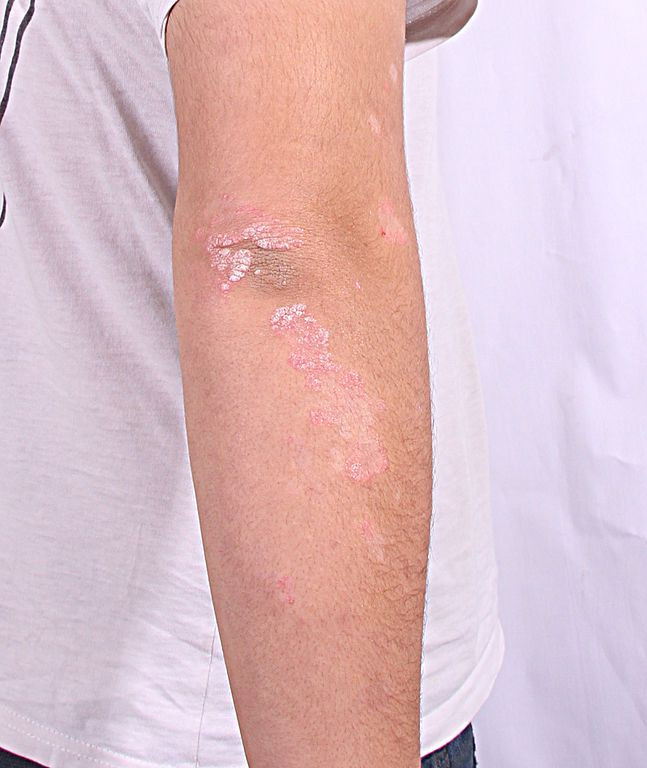Psoriasis Linked To Other Serious Conditions, Including Pulmonary Disease And Diabetes

A chronic, autoimmune disease, psoriasis appears on the skin. That fact, in many cases, may be among the most painful aspects of the condition: it cannot be hidden. Although psoriasis is not contagious, sufferers may feel themselves to be exiles in a world of intimacy.
According to the National Psoriasis Foundation, psoriasis ranks among the most common autoimmune diseases in the U.S., affecting as many as two to three percent of the population or between 5.8 and 7.5 million people. There are five distinct types, though commonly it develops into raised, red patches covered with flaking, dead skin cells; all five types are a result of the immune system mistakenly speeding up the growth cycle of skin cells.
Unfortunately, there is even worse news: increasing evidence suggests that psoriasis has far-reaching effects, and one new study demonstrates that psoriasis is linked to an increased presence of other diseases that affect the lungs, heart, kidneys, liver, and pancreas.
Survey
To determine what other diseases might co-exist in patients with psoriasis, researchers from the University of Pennsylvania analyzed data from The Health Improvement Network (THIN), an electronic medical records database in the United Kingdom. Specifically, they looked at information concerning 7.5 million registered patients from 415 general practices and ended up with a sample size of 9,035 eligible psoriasis patients.
Next, the researchers mailed questionnaires to each patient's general practitioners (England’s version of a primary care physician) in order to better understand the extent of each patient's disease. The practitioners rated the severity of psoriasis for each patient as mild, moderate, or severe based on the amount of body surface affected. Roughly 52 percent of the patients were characterized as mild, 36 percent moderate, and 12 percent severe. Over the next year, the researchers collected the completed questionnaires and compared the patients' information to that of “controls,” people who fit into a similar demographic (including age and other qualities) but who had never been diagnosed with psoriasis.
Findings
Overall, those patients with psoriasis — whether mild, moderate, or severe — had a major disease more often than the controls. They showed a higher prevalence of chronic pulmonary disease, diabetes mellitus, diabetes with systemic complications, mild liver disease, myocardial infarction, peptic ulcer disease, peripheral vascular disease, renal disease, and rheumatologic disease.
“The burdens of overall medical comorbidity and of specific comorbid diseases increase with increasing disease severity among patients with psoriasis,” wrote the authors. “Physicians should be aware of these associations in providing comprehensive care to patients with psoriasis, especially those presenting with more severe disease.”
In an unrelated series of eight studies conducted by the National Psoriasis Foundation in the fall and spring of 2003, 2004, 2005, and 2006, nearly half of the respondents reported that psoriasis negatively impacts daily life and causes problems sleeping. Nearly one-third stated that the disease interfered with their sexual activity. Respondents also reported difficulty using their hands, walking, sitting for long periods, and standing for long periods.
Worst of all, less than a third of the respondents reported that they felt very satisfied with their treatment.
Treatment
According to the National Institutes of Health, psoriasis is most-often treated with topical medications, including:
-Cortisone creams and ointments
-Creams and ointments with coal tar or anthralin
-Prescription medicines containing vitamin D or vitamin A, also known as retinoids
-Creams intended to remove the scaling (such as those that contain salicylic acid or lactic acid)
-Over-the-counter moisturizers
For those with very severe psoriasis, medicines that suppress the immune system's faulty response may be recommended, including drugs that contain methotrexate, cyclosporine, or acitretin. Biologics have also been approved for the treatment of psoriasis, and these include:
-Adalimumab (Humira)
-Alefacept (Amevive)
-Etanercept (Enbrel)
-Infliximab (Remicade)
-Stelara
If these treatments fail, doctors may recommend phototherapy, which involves the affected skin being exposed to ultraviolet light.
Sources: Yeung H, Takeshita J, Mehta NN, et al. Psoriasis Severity and the Prevalence of Major Medical ComorbidityA Population-Based Study. JAMA Dermatology. 2013
Horn EJ, Cather JC. Psoriasis affects daily activities: National Psoriasis Foundation survey panels. National Psoriasis Foundation.



























